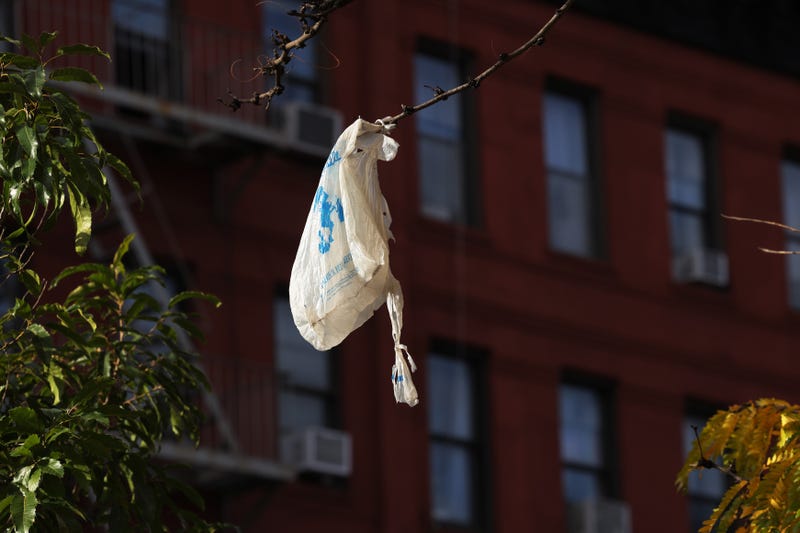
PHILADELPHIA (KYW Newsradio) — If you live in New Jersey and love disposable, single-use plastic bags — Styrofoam cups, plastic straws, paper bags — then why are you reading an environmental sustainability blog?
Secondly, start hoarding.
Kidding, of course, about the hoarding — you have 18 months to collect a good stock of reusable bags and containers and to implement them in your shopping routine.
This past week — one of the biggest political news weeks in recent memory — New Jersey Gov. Phil Murphy signed into law what’s widely seen as the strictest ban of disposable containers in the nation.
As of May 2022, a broad range of stores and food-service businesses in the Garden State will no longer be allowed to sell you their products in the aforementioned packaging, which goes on to clutter our landfills — when it’s not littering our surroundings and clogging our waterways.
Plastic straws will disappear as of November 2021, unless a customer specifically requests one.
“Plastic bags are one of the most problematic forms of garbage, leading to millions of discarded bags that stream annually into our landfills, rivers, and oceans,” Murphy said in a statement. “With today’s historic bill signing, we are addressing the problem of plastic pollution head-on with solutions that will help mitigate climate change and strengthen our environment for future generations.”
There are some notable exemptions to the ban, such as dry cleaning and newspaper bags, and bags for loose items such as produce or even a pet store goldfish. Producers of other items, like polystyrene butcher trays or pre-packaged food, have until 2024 to figure out a more planet-friendly alternative.
Penalties for violations range from a warning to fines — $5,000 for the third violation and every one after it. The New Jersey Clean Communities program fund, the agency behind those adopt-a-beach and adopt-a-highway programs, will turn the collected cash into litter and graffiti abatement grants across the state and develop a public information campaign about the new regulations in the bill.
What makes the law the toughest in the U.S. is its outright ban on paper bags. While some states that ban plastic bags require charging customers for paper instead, New Jersey recognizes the pollution caused by the energy and resources used to produce paper bags as well, and includes them in the list of packaging that stores will get fined for providing.
The cost of deforestation for paper bags is an easy connect-the-dots concept, but it’s easy to forget that plastic bags and the other banned packaging are born from the oil and natural gas industries. Drilling and fracking release methane, a greenhouse gas that’s 25 times more harmful than carbon dioxide and has been linked to a range of health issues.
Fracking uses and reuses water through a process that often taps many contaminants — radioactive materials, salts, heavy metals and hydrocarbons — that exist naturally underground but are health hazards when stored on-site or released into waterways.
The harvested gas is reduced to plastic pellets that are blown into the plastic bags, which we use for a few minutes and then remove from our lives via the trash can or recycling bin, only to go get more.
Data from Philadelphia’s Trash Academy finds each American uses about 365 plastic bags a year — about one a day.
“From our soil to our drinking water contamination, from asthma to cancers and various public health issues to climate change, plastic bags have so many hidden costs that we really don’t see at checkout,” read the introductory quote and message behind Trash Academy’s presentation at the 2020 Greenfest Philly in September, titled “Plastic Bag ‘Implosion’ – No Such Thing as Free Bags.” (You can watch their excellent breakdown of the hidden costs of plastic bags here.)
Trash Academy breaks down the numbers:
• We’re producing about 30% more trash now than before the coronavirus pandemic. All those disposables!
• About 91% of plastic is not recycled. How much is in your recycling bin?
• The average amount of time a plastic bag is used before it’s tossed is 12 minutes.
• About 17% of floatables in Philly waterways are plastic bags.
• By 2050, it’s estimated there will be more plastic in the ocean than fish.
• Microplastic particles are in the air we breathe, the water we drink, and the cosmetics we use.
That convenient, flimsy carryall from the store is looking less attractive now, no?
Jan Dell, an engineer and founder of The Last Beach Cleanup, said there’s no sane way to try to collect all the single-use plastics that stray from trash receptacles or to try to separate it out for any hope of recycling.
“The most sane way is to try to use less and stop the plastic pollution problem before it starts,” she said.
Here’s to sanity and reusable shopping bags.

